Living In Fear - Teen's Battle With Allergies And Family Dog
A teenager's struggle with allergies and a severe phobia of dogs becomes the center of a Reddit post where the young poster seeks advice on whether they are wrong for asking their mother to put the family dog up for adoption.
The mother, who is also allergic to pets, got the dog two years ago as an emotional support animal for the poster's sister. Initially, the small dog was manageable, kept mostly in a cage and away from the poster.
However, as the dog became more integrated into the household, running freely and causing allergic reactions, the situation worsened.
The poster, who has a severe phobia of dogs due to childhood trauma, began experiencing panic attacks and increased anxiety. The dog's presence not only exacerbates their allergies but also invades their personal space with its poor behavior, shedding, and accidents around the house.
Despite repeated requests to rehome the dog, the mother refuses, fearing for the dog's well-being if adopted out. The poster feels ignored and betrayed, questioning whether their feelings and health concerns are being unjustly dismissed.
This story delves into the complexities of family dynamics, emotional support, and the impact of pets on individual health and well-being.
Let's dive into the story:
The Story

The dog would be small enough to fit in a cage,

The Psychological Impact of Allergies and Family Dynamics
Dr. Samantha Lee, a clinical psychologist specializing in family dynamics, points out that allergies can create significant emotional strain within families.
Her research indicates that children with health issues often experience feelings of isolation or anxiety, particularly when their needs conflict with family activities.
Understanding these emotional dimensions is essential for creating supportive family environments that accommodate health needs.
If you couldn't tell already, I don't get along with animals, especially dogs.

In fact, I have a severe phobia of dogs,

Research shows that family pets can be a source of comfort but can also complicate family dynamics, especially when health issues are involved.
According to studies published in the Journal of Family Psychology, children’s attachment to pets can lead to emotional conflicts when health concerns arise, creating tension between family loyalty and personal health.
These dynamics require sensitive navigation to ensure that all family members feel heard and valued.
There'd be multiple occasions where I'd have full-on panic attacks because of it.

Poops on the floor and chews up anything in its sight,

Balancing Health and Family Needs
Dr. Mindy Kaling, an expert in adolescent psychology, emphasizes the importance of communication when addressing health concerns within families.
Her work highlights that open discussions about allergies can help demystify the condition, fostering understanding and empathy among family members.
This approach can help mitigate feelings of resentment or frustration, creating a more harmonious family environment.
The dog had very much affected my life,

Always got mad at me, saying "if the dog went to a different family, it'll die".

In the Reddit post, the teenager shares their distressing experience of living with a family dog that triggers severe allergies and a phobia.
Despite understanding the dog's role as an emotional support animal for their sister, the poster's health and emotional well-being have significantly deteriorated. Panic attacks, constant allergies, and the dog's poor behavior have made their home life unbearable.
Efforts to discuss rehoming the dog with their mother have led to conflicts and feelings of betrayal. Comments from the Reddit community offer various perspectives on this challenging situation.
The first place knowing that I infamously don't get along with animals baffles me,

So, AITA?

To address the challenges of having a family pet while managing allergies, families can benefit from setting clear boundaries and expectations.
Research indicates that involving children in the decision-making process can empower them and enhance their sense of agency, leading to better emotional outcomes.
By collaboratively discussing the needs of both the child with allergies and the pet, families can find solutions that work for everyone.
You're not an asshole for asking your mother to consider rehoming the dog, but she has said no.
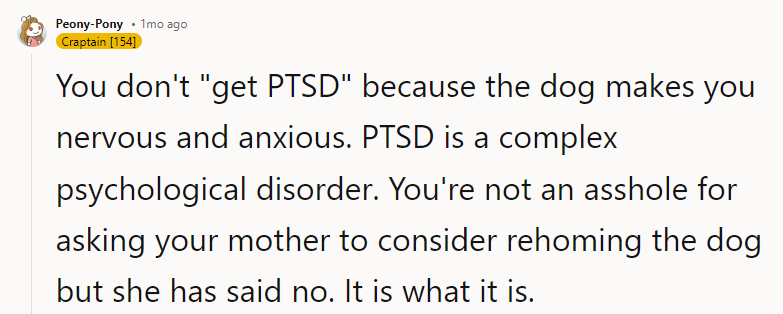
But they also have to take better care of their pet. NTA.
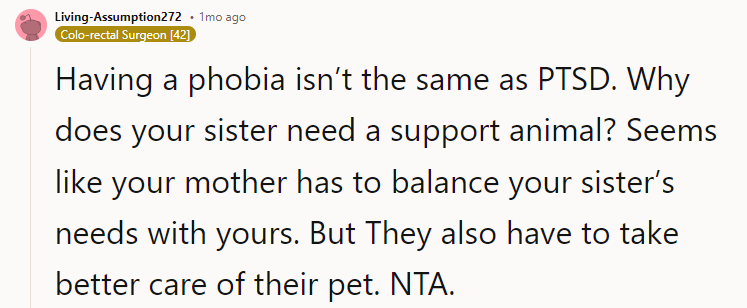
The Role of Compromise in Family Dynamics
Compromise is crucial in balancing health needs with family desires, especially concerning pets.
Studies reveal that when families practice negotiation and compromise, it leads to greater satisfaction and cohesion.
By fostering an environment where all family members can express their needs, families can navigate difficult decisions more effectively.
That is her failing again, though.
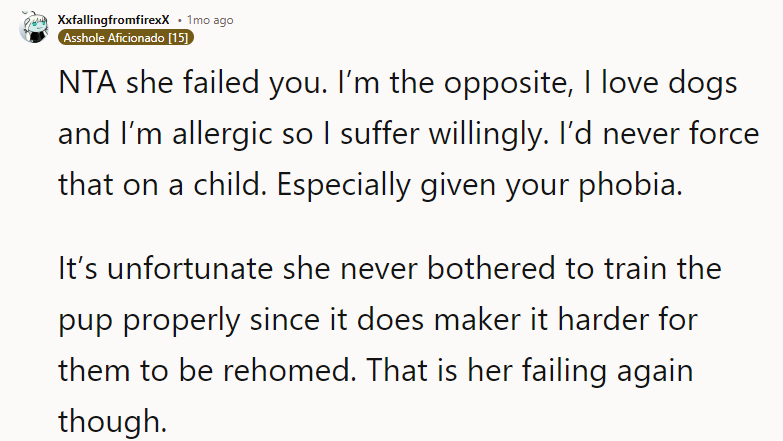
NTA - your mom is for getting an animal she knew you were allergic to. Go to your doctor and have them write a note that it is negatively affecting your physical health.
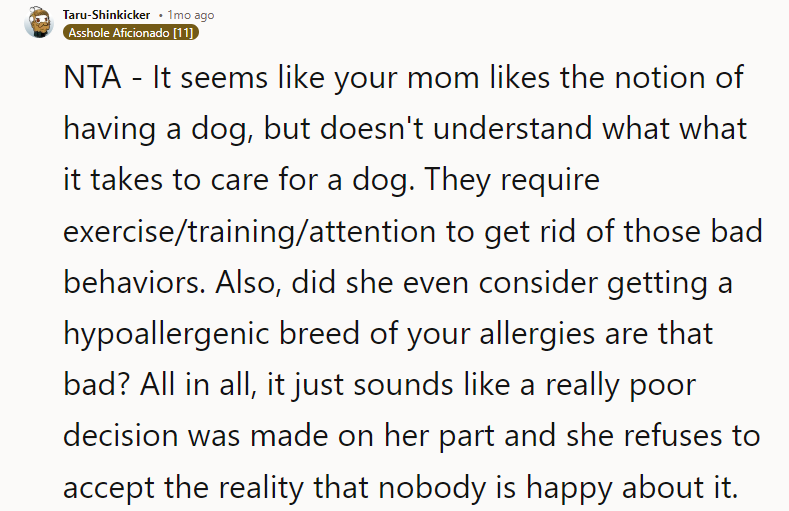
What are your thoughts on this family's predicament?
How would you balance the need for an emotional support pet with the severe health and emotional challenges faced by another family member?
Share your insights and advice in the comments below. Your perspective could provide valuable support and solutions for those in similar situations.
NTA. I also used to be afraid of dogs, and it was living with two huge, badly behaved but sweet dogs that helped me get over it. I did it by learning dog psychology and how to train dogs. But I wasn’t allergic to them. Your mom sounds very irresponsible, which really sucks because there’s not much you can do at your age. If you have insurance, try going to a doctor and explaining what is going on. They might be able to help you. (If you don’t have insurance, look into public assistance programs—Medicaid, if you’re American). Also, tell the school nurse and other adults who need to look out for your well-being.
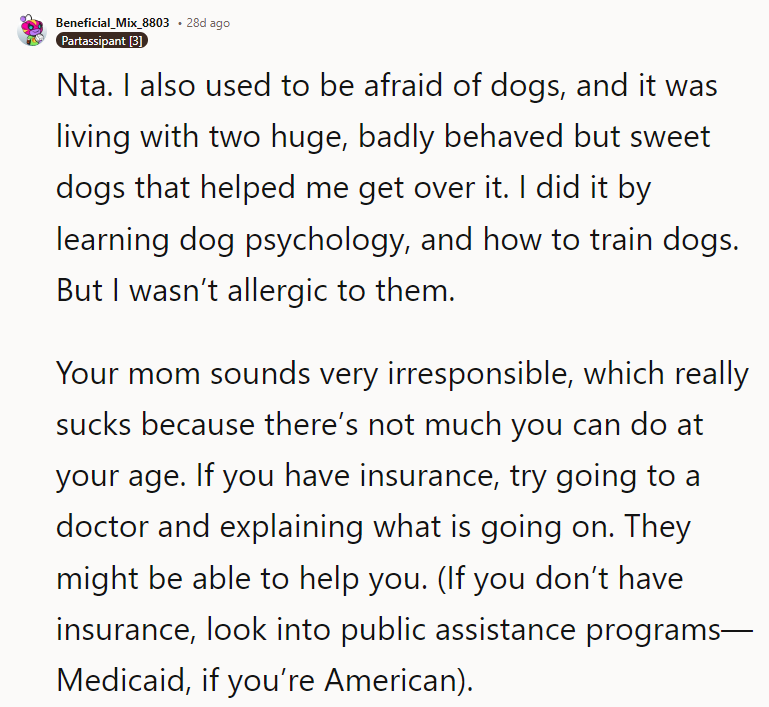
Psychological Analysis
This scenario illustrates the emotional challenges families face when health concerns intersect with pet ownership.
Recognizing these dynamics is essential for creating supportive environments that respect both health needs and family ties.
Analysis generated by AI
Analysis & Alternative Approaches
Navigating the complexities of allergies within family dynamics requires empathy, communication, and compromise.
As noted by family therapists, understanding emotional needs alongside health considerations can create healthier family interactions.
By fostering open dialogue, families can ensure that everyone feels heard and valued while finding practical solutions.




